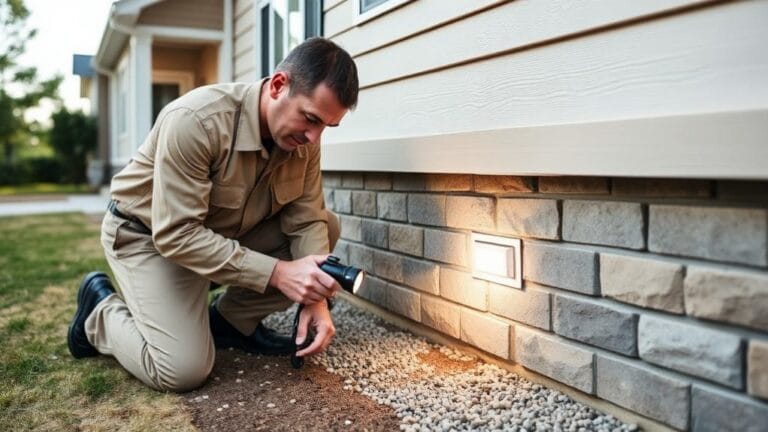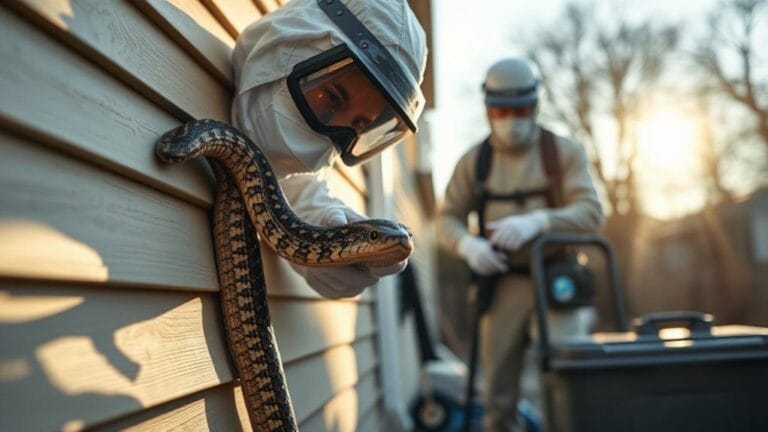Are you tired of dealing with the unnerving presence of a snake in your basement? Well, fear not! This article is here to guide you on what to do when encountering such a situation.
From identifying the snake species to implementing effective removal methods, you’ll learn how to handle the situation with confidence.
We’ll also share tips on sealing potential entry points and preventing future snake infestations.
So, let’s dive into the world of snake removal and ensure a snake-free basement for you and your family.
Key Takeaways
Table of Contents
- Identify and seal any openings leading from outside into the basement to prevent snake entry.
- Call a professional snake removal service if you are unable to identify the snake species or if dealing with venomous snakes.
- Use traps and removal tools to catch and remove non-venomous snakes from the basement.
- Keep the basement well-sealed and eliminate potential hiding places to prevent snake infestations.
Dealing With Snakes in the Basement
If you’ve snakes in your basement, it’s important to identify the snake species before attempting to remove them.
Snakes are often attracted to basements because of the presence of mice and rats, so preventing rodent infestations is crucial.
To deal with the snakes, you have a few options. First, you can try picking up non-venomous snakes with gloves and bringing them outside.
Another option is to hire professional removal services, as they have the expertise to handle and remove snakes safely. Additionally, you can set snake traps to catch and remove them. Remember to use extreme care and snake removal tools for venomous snakes.
After removing the snakes, it’s essential to identify and seal any openings leading from outside into the basement to prevent further infestations.
Identifying and Dealing With Snakes in the Basement
To effectively address the issue, it’s important for you to accurately identify and deal with any snakes present in your basement. Here are some steps to help you with the process:
- Identify the snake species: It’s crucial to determine the type of snake you’re dealing with. This will help you understand its behavior and whether it poses any danger.
- Call professional snake removal services: If you’re uncertain about the snake species or feel uncomfortable handling it, it’s best to seek help from experts. They have the knowledge and experience to safely remove snakes from your basement.
- Take precautions when dealing with venomous snakes: If you do encounter a venomous snake, it’s essential to exercise extreme care. Avoid any direct contact and use specialized snake removal tools if necessary.
- Seal any openings: Once the snakes have been removed, identify and seal any openings that allow them to enter your basement. This will help prevent future infestations and ensure your freedom from these unwanted guests.
Catching and Removing Snakes From the Basement
If you find snakes in your basement, it’s important to catch and remove them safely. Use gloves to pick up non-venomous snakes and release them outside.
For venomous snakes, it’s best to call a professional snake removal service.
Set traps to catch and remove snakes, and seal any openings leading from outside into the basement to prevent future infestations.
Safe Snake Removal Techniques
Identifying the snake species in your basement is crucial before attempting any removal methods. Here are four safe snake removal techniques to consider:
- Call a professional snake removal service: This ensures that the removal process is handled by experienced experts who can safely handle and relocate the snake without causing harm.
- Use safe snake handling techniques: If you feel comfortable doing so, you can use gloves to pick up non-venomous snakes and bring them outside. However, it’s important to note that this should only be done if you’re confident in your ability to handle snakes safely.
- Set snake traps: Placing traps with adhesive floors can be an effective way to catch and remove snakes from your basement. Regularly check the traps and release the snakes at least five miles away from your property.
- Use extreme care and snake removal tools for venomous snakes: If you suspect that the snake in your basement is venomous, it’s crucial to exercise extreme caution. Don’t attempt to handle or remove the snake yourself. Instead, call a professional snake removal service to ensure the safe removal of the venomous snake.
Preventing Future Snake Infestations
Ensure that all small openings, such as cracks in the foundation and damaged vents, are properly sealed to prevent future snake infestations in your basement.
By taking proactive measures to seal these entry points, you can effectively deter snakes from returning and ensure the safety and peace of mind in your home.
To assist you in preventing snake recurrence and deterring snakes from basements, consider the following table outlining key strategies:
| Strategies to Prevent Snake Infestations |
|---|
| Identify and seal any openings leading from outside into the basement |
| Fit mesh grilles on drainage pipes to block snake access |
| Ensure tight-fitting doors and windows in the basement |
| Check for holes in the walls that could allow snakes to enter |
| Properly seal the basement to prevent further snake infestations |
Sealing the Basement to Prevent Snake Entry
To prevent snakes from entering your basement, make sure to seal small holes, spaces under doors, and damaged vents. Here are four basement snake control techniques to help you keep those slithery intruders out:
- Seal all small holes: Snakes can squeeze through tiny openings, so inspect your basement for any cracks or gaps in the walls or foundation. Use caulk or weatherstripping to seal these entry points.
- Secure spaces under doors: Snakes can easily slide under doors with gaps. Install door sweeps or draft stoppers to eliminate these openings and create a tight seal. Repair damaged vents: Check your basement vents for any damages or holes. Replace or repair them to ensure snakes can’t enter through these access points.
- Clear clutter: Remove any debris, clutter, or tall grass near the foundation of your home. Snakes are attracted to hiding spots, so keeping your basement surroundings clean and tidy will discourage them from entering.
Keeping Snakes Out of the Basement
To keep snakes out of your basement, there are a few key steps you can take.
First, make sure to seal any openings leading from outside into the basement. This will prevent snakes from finding their way in.
Next, eliminate hiding places by keeping your yard well-maintained and removing any debris or clutter.
Preventing Snake Entry
One way to prevent snakes from entering your basement is by sealing small holes, spaces under doors, and damaged vents. Here are four steps to help you snake-proof your basement:
- Inspect your basement thoroughly for any openings or gaps that snakes could use to enter. Look for cracks in the foundation, uneven door jams, and damaged window molding. Patch up these openings to prevent snakes from getting in.
- Install mesh grilles on drainage pipes to block snake access. Ensure that your doors and windows in the basement are tight-fitting to eliminate any gaps.
- Check for holes in the walls that could allow snakes to enter. Properly seal these holes using caulk or other appropriate materials.
- Keep the trim cut low around your house to eliminate snake hiding spots.
Eliminating Hiding Places
By practicing good yard keeping and regularly weeding gardens, you can eliminate hiding places that may attract snakes.
Snake proofing methods and proper yard maintenance are crucial in deterring snakes from your property.
Start by trimming low limbs of shrubs and hedges to 12 inches from the ground, as these can provide hiding spots for snakes.
Regularly weed your gardens to remove cover and reduce hiding places.
It’s also important to move brick piles, metal sheets, and firewood away from your residence, as these can create cozy spots for snakes to hide.
Additionally, removing debris and clutter from your yard will create an environment that’s less appealing to snakes.
Ways for a Snake to Get in the Basement
If you notice cracks in the foundation or uneven door jams, those can be ways for a snake to get into your basement. To prevent snakes from entering your basement, here are four effective snake prevention methods:
- Seal any openings: Identify and seal any openings leading from outside into the basement. This includes small holes, damaged vents, and spaces under doors. Properly sealing the basement will help prevent snake entry.
- Fit mesh grilles: Fit mesh grilles on drainage pipes to block snake access. This will create a barrier and prevent snakes from entering through the pipes.
- Tight-fitting doors and windows: Ensure that doors and windows in the basement are tight-fitting. Check for any gaps or holes in the walls that could allow snakes to enter.
- Trim low: Keep trim cut low to eliminate snake hiding spots. By keeping the vegetation around your basement trimmed, you’ll reduce the chances of snakes finding a place to hide.
Frequently Asked Questions
How Can I Prevent Snakes From Entering My Basement?
To prevent snakes from entering your basement, seal any openings leading from outside. Fit mesh grilles on drainage pipes and ensure tight-fitting doors and windows. Eliminate hiding places and remove debris from the yard.
Are There Any Natural Snake Repellents That Can Be Used in the Basement?
Unfortunately, there are no proven natural snake repellents that are effective in the basement. It’s best to focus on prevention methods like sealing openings and removing potential prey to keep snakes out.
What Should I Do if I Find a Snake Nest in My Basement?
If you find a snake nest in your basement, it’s important to handle the situation carefully. Contact professional snake removal services for safe and effective snake nest removal. They have the expertise to handle the situation properly.
How Long Does It Typically Take for a Snake to Clear a Rodent Population in a Basement?
It typically takes a snake a few weeks to clear a rodent population in a basement. Signs of a snake infestation include shed skins, droppings, and sightings. Implement snake control methods to prevent further infestations.
Is It Safe for Me to Handle a Non-Venomous Snake and Release It Outside on My Own?
Yes, it is generally safe for you to handle a non-venomous snake and release it outside on your own. Remember to wear gloves and be gentle when handling the snake to ensure its safety during relocation.
Conclusion
In conclusion, encountering a snake in your basement can be a nerve-wracking experience. However, by following the steps outlined in this article, you can safely and effectively deal with the situation.
From identifying the snake species to implementing appropriate removal methods and sealing off potential entry points, you can ensure a snake-free basement for you and your family.
So, don’t let fear take over, take action and create a safe environment for everyone.








